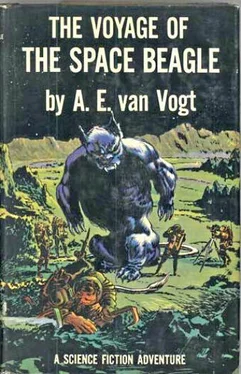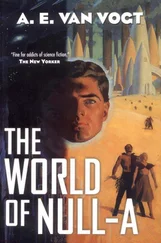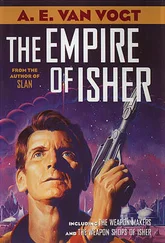The chief chemist said in a bitter voice, “There’ll be no immediate funeral. The damned cat wanted something from the body. It looks to be all there, but something must be missing. I’m going to find out what, and pin this murder on that beast, so you’ll have to believe it beyond a shadow of a doubt.”
Back on the ship, Elliott Grosvenor headed for his own department. The sign on the door read, “SCIENCE OF NEXIALISM.” Beyond it were five rooms measuring altogether forty by eighty feet of floor space. Most of the machines and instruments that the Nexial Foundation had asked the government for had been installed. As a result, space was rather cramped. Once through the outer door, he was alone in his private preserve.
Grosvenor seated himself at his work desk and started his brief to Director Morton. He analysed the possible physical structure of the catlike inhabitant of this cold and desolate planet. He pointed out that so virile a monster should not be regarded merely as a “biological treasure house”. The phrase was dangerous in that it might make people forget that the beast would have its own drives and needs based on a non-human metabolism. “We have enough evidence now,” he dictated into the recorder, “to make what we Nexialists call a Statement of Direction.”
It took him several hours to complete the Statement. He carried the wire to the stenography section and put in a requisition for an immediate transcription. As head of a department, he got prompt service. Two hours later, he delivered the brief to Morton’s office. An under-secretary gave him a receipt for it. Grosvenor ate a late dinner in the commissary, convinced , that he had done what was possible to him. Afterwards, he inquired of the waiter where the cat was. The waiter wasn’t sure, but he believed the beast was up in the general library.
For an hour, Grosvenor sat in the library watching Coeurl. During that time, the creature lay stretched out on the thick carpet, never once moving his position. At the end of the hour, one of the doors swung open, and two men came in carrying a large bowl. Following close behind them was Kent. The chemist’s eyes were feverish. He paused in the middle of the room, and said in a weary yet harsh voice, “I want you all to watch this!”
Though his words included everyone in the room, he actually faced a group of top scientists who sat in a special reserved section. Grosvenor stood up and had a look at what was in the bowl carried by the two men. It contained a brownish concoction.
Smith, the biologist, also climbed to his feet. “Wait a minute, Kent. Any other time I wouldn’t question your actions. But you look ill. You’re overwrought. Have you got Morton’s permission for this experiment?”
Kent turned slowly. And Grosvenor, who had seated himself again, saw that Smith’s words had conveyed only a part of the picture. There were dark circles under the chief chemist’s eyes. And his cheeks seemed sunken. He said, “I invited him to come up here. He refused to participate. His attitude is that if this being does willingly what I want, no harm will be done,”
Smith said, “What have you got there? What’s in that bowl?” “I’ve identified the missing element,” Kent said. “It’s potassium. There was only about two-thirds or three-quarters of the normal amount of potassium left in Jarvey’s body. You know how potassium is held by the body cells in connection with a large protein molecule, the combination providing the basis for the electrical charge of the cell. It’s fundamental to life. Usually, after death the cells release their potassium into the blood stream, making it poisonous. I proved that some potassium is missing from Jarvey’s cells but that it did not go into the blood. I’m not sure of the full significance of that, but I intend to find out.”
“What about the bowl of food?” somebody interrupted. Men were putting away magazines and books, looking up with interest.
“It’s got living cells with potassium in suspension. We can do that artificially, you know. Maybe that’s why he rejected our food at lunch time. The potassium was not in a useable form for him. My idea is he’ll get the scent, or whatever he uses instead of scent—”
“I think he gets the vibrations of things,” Gourlay interjected with a drawl. “Sometimes when he wiggles those tendrils, my instruments register a distinct and very powerful wave of static. And then, again, there’s no reaction. My guess is he moves on to a point higher or lower on the wave scale. He seems to control the vibrations at will. I’m assuming the actual motion of the tendrils does not in itself generate these frequencies.” Kent waited with obvious impatience for Gourlay to finish, then he went on. “All right, so it’s vibrations that he senses. We can decide what his reaction to this vibration proves when he starts reacting.” He concluded in a mollifying tone, “What do you think, Smith?”
“There are three things wrong with your plan,” the biologist replied. “In the first place, you seem to assume that he is only animal. You seem to have forgotten he may be surfeited after having fed on Jarvey — if he did. And you seem to think he will not be suspicious. But have the bowl set down. His reaction may tell us something.”
Kent’s experiment was reasonably valid, despite the emotion behind it. The creature had already shown that he could respond violently when suddenly stimulated. His reaction to being locked up in the elevator could not be dismissed as unimportant. So Grosvenor analysed.
Coeurl stared with unblinking eyes as the two men set the bowl before him. They retreated quickly, and Kent stepped forward. Coeurl recognized him as the one who had held the weapon that morning. He watched the two-legged being for a moment, then gave his attention to the bowl. His ear tendrils identified the thrilling emanation of id from the contents. It was faint, so faint as to have been unnoticeable until he concentrated on it. And it was held in suspension in a manner that was almost useless to him. But the vibration was strong enough to point at the reason for this incident. With a snarl, Coeurl rose to his feet. He caught the bowl with the suction cups at the end of one looping tentacle, and emptied its contents into the face of Kent, who shrank back with a yell.
Explosively, Coeurl flung the bowl aside and snapped a hawser-thick tentacle around the cursing man’s waist. He didn’t bother with the gun that hung from Kent’s belt. It was only a vibration gun, he sensed — atomic powered, but not an atomic disintegrator. He tossed the squirming Kent into a corner, and then realized with a hiss of dismay that he should have disarmed the man. Now he would have to reveal his defensive powers.
Kent furiously wiped the gruel from his face with one hand, and with his other hand reached for his weapon. The muzzle snapped up, and the white beam of the traced light flashed at Coeurl’s massive head. Ear tendrils hummed as they automatically cancelled out the energy. Round black eyes narrowed as he caught the movement of men reaching for their vibrators.
From near the door, Grosvenor said sharply, “Stop! We’ll all regret it if we act hysterically.”
Kent clicked off his weapon and half turned to send a puzzled glance at Grosvenor. Coeurl crouched down, glowering at this man who had forced him to reveal his ability to control energies outside his body. There was nothing to do now but wait alertly for repercussions.
Kent looked again at Grosvenor. This time his eyes narrowed “What the hell do you mean by giving orders?”
Grosvenor made no reply. His part of the incident was finished. He had recognized an emotional crisis, and he had spoken the necessary words in the right tone of peremptory command. The fact that those who had obeyed him now questioned his authority to give the command was unimportant. The crisis was over.
Читать дальше











